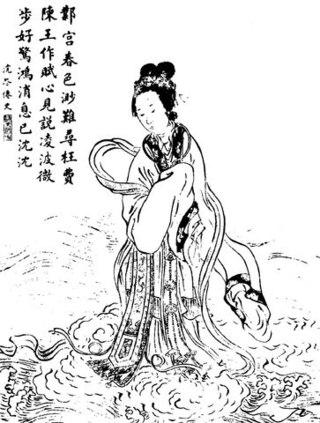Related Research Articles

Zhang Fei, courtesy name Yide, was a military general serving under the warlord Liu Bei in the late Eastern Han dynasty and early Three Kingdoms period of China. Zhang Fei and Guan Yu, who were among the earliest to join Liu Bei, shared a brotherly relationship with their lord and accompanied him on most of his early exploits. Zhang Fei fought in various battles on Liu Bei's side, including the Red Cliffs campaign (208–209), takeover of Yi Province (212–214), and Hanzhong Campaign (217–218). He was assassinated by his subordinates in 221 after serving for only a few months in the state of Shu Han, which was founded by Liu Bei earlier that year.

Lady Zhen, personal name unknown, was the first wife of Cao Pi, the first ruler of the state of Cao Wei in the Three Kingdoms period. In 226, she was posthumously honoured as Empress Wenzhao when her son, Cao Rui, succeeded Cao Pi as the emperor of Wei.
Empress Wu, personal name Wu Xian, formally known as Empress Mu, was an empress of the state of Shu Han during the Three Kingdoms period. She was the last wife and the only empress of Liu Bei, the founding emperor of Shu Han, and a younger sister of Wu Yi.
Empress Zhang, personal name unknown, was the last empress of the state of Shu Han in the Three Kingdoms period. She was a daughter of the Shu general Zhang Fei, and was a younger sister of Empress Jing'ai. In 237, she became an Imperial Consort of the Shu emperor Liu Shan. She became empress in February 238, succeeding her elder sister, who had died in the previous year.
Wu Ban, courtesy name Yuanxiong, was a Chinese military general of the state of Shu Han in the Three Kingdoms period of China.
Zhuge Qiao (204–228), courtesy name Bosong, was an official of the state of Shu Han in the Three Kingdoms period of China. He was the adopted son of Zhuge Liang, the Imperial Chancellor and regent of Shu from 223 to 234. His biological father was Zhuge Liang's elder brother Zhuge Jin, a military general of Shu's ally state, Eastern Wu.
Cao Bao was a military officer serving under Tao Qian, the Governor of Xu Province, during the late Eastern Han dynasty of China. He became a subordinate of Tao Qian's successor, Liu Bei, after Tao's death in 194. He was killed by Zhang Fei in 196 after a quarrel.
Liu Xuan, courtesy name Wenheng, was a prince of the state of Shu Han during the Three Kingdoms period. He was the eldest son of Liu Shan, the second and last ruler of Shu. His mother was Consort Wang (王貴人), a former servant of Liu Shan's first wife Empress Jing'ai; Lady Wang later became one of Liu Shan's concubines. Liu Xuan became crown prince in c.February 238. After the fall of Shu to the rival state of Wei, Liu Xuan and his surviving brothers returned to the capital, Chengdu. In March 264, Liu Xuan was killed in Chengdu by rebelling soldiers during Zhong Hui's rebellion.
Zhang Chunhua was a Chinese noble lady and aristocrat. She was the wife of Sima Yi, a prominent military general and regent of the state of Cao Wei during the Three Kingdoms period of China. She was posthumously honoured as Empress Xuanmu in 266 by her grandson Sima Yan, who ended the Cao Wei state and established the Jin dynasty that year.
This article contains the family trees of members of the Liu clan, who ruled the state of Shu Han (221-263) in the Three Kingdoms period (220-280) in China. They were related to the House of Liu, the imperial clan of the Han dynasty.
This article contains the family trees of members of the Cao clan, who ruled the state of Cao Wei (220–265) in the Three Kingdoms period (220–280) in China. Only Cao Cao's lineage is shown in this article. The lineages of his relatives, such as Cao Ren, Cao Zhen and others, are not included here.
Wu Yi courtesy name Ziyuan was a Chinese military general of the state of Shu Han in the Three Kingdoms period of China. His younger sister, Empress Mu, was the empress consort of Shu's founding emperor, Liu Bei. Wu Yi had a younger relative, Wu Ban, who also served as a general in Shu.
Sima Yi (179–251) was a general, politician and regent of the state of Cao Wei (220–266) in the Three Kingdoms period (220–280) in China. Two of his sons, Sima Shi (208–255) and Sima Zhao (211–265), rose to power in the 250s and consecutively served as regents throughout the reigns of the last three Wei emperors. After Sima Zhao died in September 265, his son Sima Yan (236–290) forced the last Wei ruler, Cao Huan (246–303), to abdicate the throne in his favour in February 266, ending the Wei regime and establishing the Jin dynasty (266–420). This article contains the family trees of Sima Yi, his brothers, and their descendants up to Sima Yan's generation. For more details on the family trees of the Jin emperors, see Chinese emperors family tree (early)#Jin Dynasty and Chu.

Zhang Nan, courtesy name Wenjin (文進), was a military officer of the state of Shu Han in the Three Kingdoms period of China.
Cao Hui was an imperial prince of the state of Cao Wei in the Three Kingdoms period of China.
Cao Mao was an imperial prince of the state of Cao Wei in the Three Kingdoms period of China.
Liu Yong (fl.221-264), courtesy name Gongshou, was an imperial prince of the state of Shu Han in the Three Kingdoms period of China. He was a son of Liu Bei, the founding emperor of Shu Han, and a younger half-brother of Liu Shan, the second Shu Han emperor.
Yang Xi, courtesy name Wenran, was an official of the state of Shu Han during the Three Kingdoms period of China. He is best known for writing the Ji Han Fuchen Zan, a collection of praises of notable persons who served in the Shu Han state. Chen Shou, the third-century historian who wrote the Records of the Three Kingdoms (Sanguozhi), extensively quoted and annotated Yang Xi's collection.
Li Miao, courtesy name Hannan, was an official of the state of Shu Han during the Three Kingdoms period of China. He previously served under the warlord Liu Zhang and later Liu Bei in the late Eastern Han dynasty.
Liu Yan, courtesy name Weishuo, was a long serving official in the state of Shu Han during the Three Kingdoms of China having served under the much travelled warlord Liu Bei during the late Eastern Han dynasty. Handsome and well spoken, he achieved high rank and favour but there were questions about his abilities, with his rank more honorary then powerful in practise, and he had a drinking problem. Nearly sacked after a fall out with Wei Yan, accusations about his wife and the Emperor saw him executed in disgrace.
References
- Chen, Shou (3rd century). Records of the Three Kingdoms (Sanguozhi).
- Pei, Songzhi (5th century). Annotations to Records of the Three Kingdoms (Sanguozhi zhu).
- Robert Joe Cutter and William Gordon Crowell. Empresses and Consorts: Selections from Chen Shou's Records of the Three States with Pei Songzhi's Commentary. Honolulu: University of Hawai'i Press, 1999.